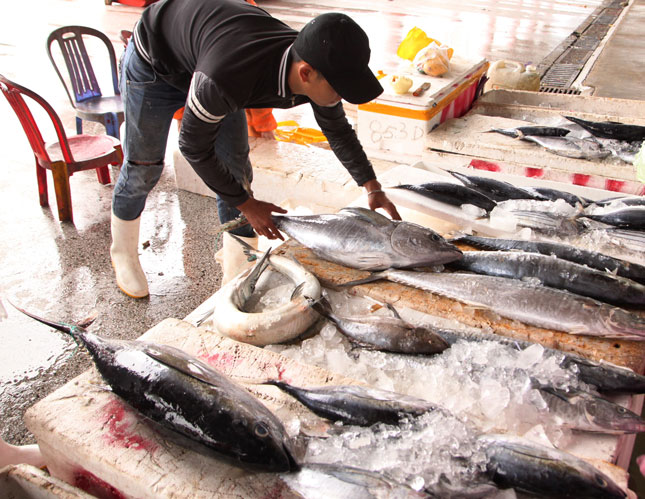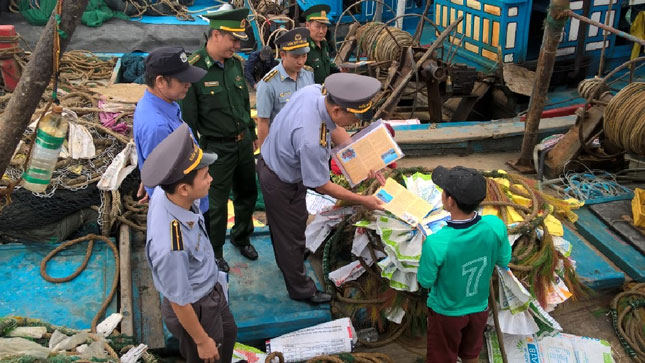Effective messures implemented to remove EU's 'yellow card'
Like other coastal localities nationwide, Da Nang is stepping up the intensive publicity of legal regulations on offshore fishing activities to curb illegal, unreported and unregulated (IUU) fishing in order to remove the European Commission’s IUU ‘yellow card’.
 |
| The origin of seafood on sale right at the Tho Quang Fishing Wharf and the city’s Seafood Wholesale Market has been always traced carefully |
In October 2017, the European Commission issued a yellow card warning Viet Nam for failing to progress in fighting IUU fishing, and gave the country 6 months to rectify the situation.
The ‘yellow card’ is a warning given by the European Commission to any “non-cooperating country” in its fight against illegal, unreported and unregulated (IUU) fishing worldwide.
The warning to Viet Nam was based on the country “not doing enough to fight illegal fishing.”
After the 6-month period of the EU’s‘yellow card,’ if significant progress is made, the ‘yellow card’ will be lifted, and replaced with a ‘green card,’ representing legal export status.
If not, a ‘red card’ will be given, meaning that Viet Nam will be banned from exporting its seafood to the European Union.
Starting from 17 March 2018, the owners of fishing vessels docked at the Tho Quang Fishing Wharf are required to report to the venue’s management board about their sea journey diary containing the co-ordinates of fishing, the origin of their catches, the specific names of fishing grounds, the number of crew member on board their vessels, and other related issues.
Fisherman Le Van Nghi from Son Tra District’s Nai Hien Dong Ward said he usually makes offshore fishing trips to the Hoang Sa Archipelago and other waters areas in the East Sea.
Nghi affirmed he and other crew members are well aware of banned fish species, the regulations on fishing nets, fishing seasons, and food safety conditions.
Another fisherman from the same district said that the EU’s regulations in seafood and sea production exports helped fishermen develop their awareness on laws and violations that they could face in fishing trips.
“We had to change, or our fish would be returned by importers. Previously, fishermen or captains were not aware of sea journey diaries, Certificates of Origin (COs), nor were they aware of the need for cold storage of fish, but it has become the norm in recent years,” he said.
It is the fact that if fishermen do not provide a fishing diary, purchasing companies would not purchase their seafood.
 |
| Representatives from relevant local agencies enthusiastically publicise the regulations on the fight against IUU fishing |
Over recent months, the municipal Department of Agriculture and Rural Development has joined forces with other relevant local agencies to organise classes on relevant laws for fishermen to help them understand more about conducting legal fishing.
In March alone, a total of 7 classes were held, and their trainees were representatives from 7 seafood processing and export enterprises, along with nearly 400 fishermen who are ship owners or captains.
Alongside, many effective measures have also been taken to trace seafood origin and punish violators.
Since the beginning of this year, a total of 6,996 origin declarations have been conducted on a total of 24,500 tonnes of seafood of all kinds which were brought to the Tho Quang Fishing Wharf.
In related news, a delegation from the European Commission’s (EC) Directorate-General for Maritime Affairs and Fisheries, which will visit Viet Nam from 16-23 May to inspect the country’s implementation of the EC’s 9 recommendations related to the fight against IUU fishing.
Through its planned field trip, the EC delegation will observe the time of unloading of foreign transport refrigerated ships at Vietnamese ports, and have technical working sessions with the Vietnamese side on imported seafood materials.
After the inspection, the EU will give its final decision over whether it seeks to withdraw the ‘yellow card’ from Vietnamese offshore seafood.
The Government has approved an action plan to prevent, minimise and eliminate IUU fishing by 2025, set be issued later this month.
Viet Nam’s seafood exports earned 8.3 billion US$ in 2017, of which 20% came from the EU market.